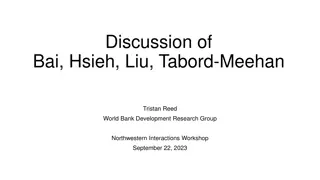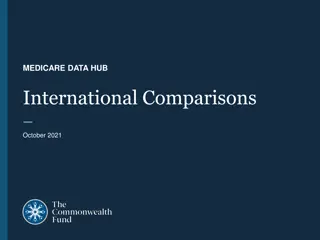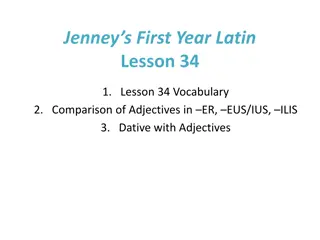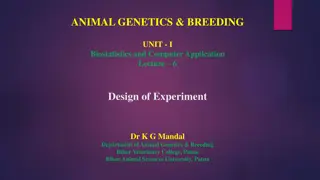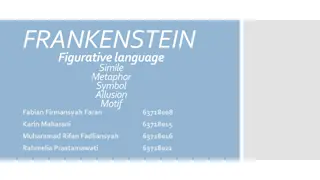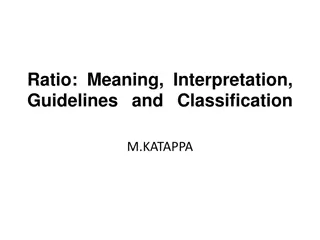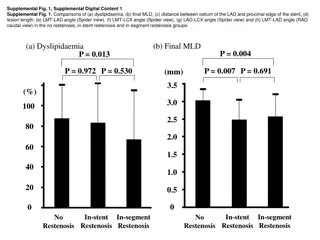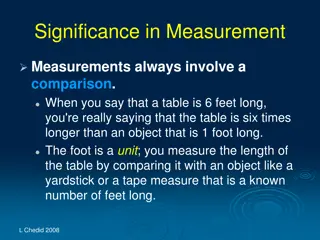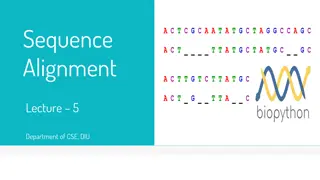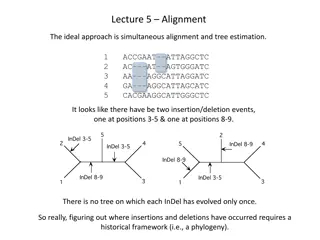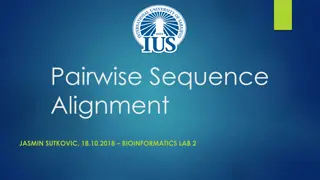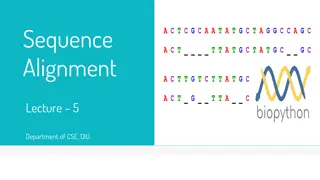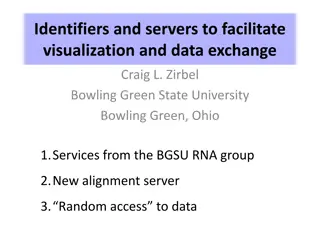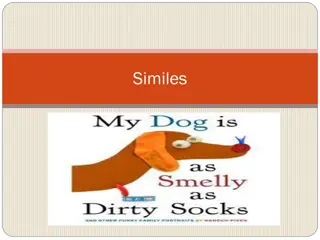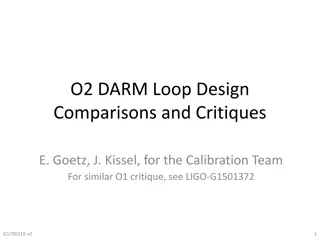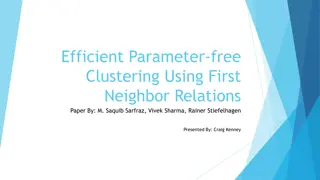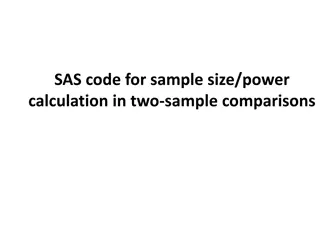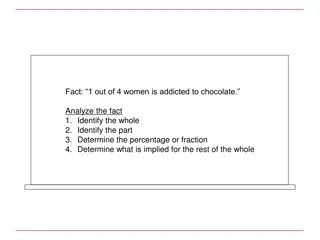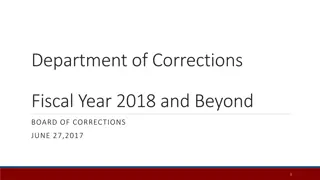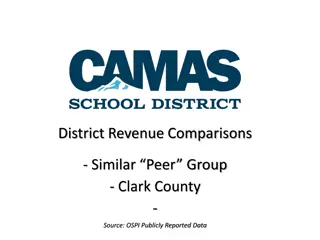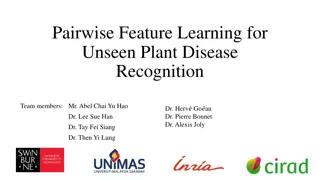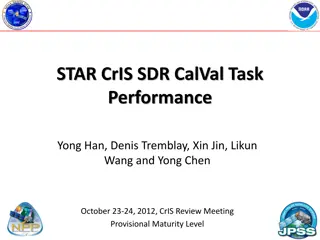University of Florida Cost Comparisons Directives
The University of Florida has established directives for cost comparisons related to business travel expenses. These guidelines ensure that the university is not paying for costs unrelated to official business. University travelers are required to obtain cost comparisons for upgrades, convenience, a
4 views • 23 slides
Discussion of Randomized Experiments and Experimental Design Challenges
Randomized experiments face statistical power challenges due to rare outcomes and high variance. Stratifying randomization can help control for correlated residual variance based on baseline values of outcomes. Implications for applied economists include addressing attrition and treatment effect het
0 views • 6 slides
Analytic Hierarchy Process (AHP) for Sustainable Smart Industry Curriculum Development
Intelligent Decision Support Systems and the Analytic Hierarchy Process (AHP) play a crucial role in the development of a Master's Degree Program in Industrial Engineering for Thailand's Sustainable Smart Industry. AHP, developed by Thomas Saaty, aids in measuring intangible factors through paired c
0 views • 23 slides
International Comparisons of Medicare Programs: October 2021
The international comparisons of Medicare programs in October 2021 reveal key insights into coverage types, affordability, and healthcare costs among older adults in various high-income countries. Private plans in the U.S. offer primary, supplemental, and prescription drug coverage, similar to model
2 views • 12 slides
Latin Lesson 34 Vocabulary: Adjective Comparisons and Dative Constructions
Learn about adjectives in ER, EUS/IUS, ILIS forms, and how they are used in comparisons. Explore dative constructions with adjectives and enhance your Latin vocabulary with words like "aureus" (golden), "dexter" (right), "difficilis" (difficult), and more.
1 views • 32 slides
Design of Experiment in Animal Genetics & Breeding: Principles and Methods
Biostatistics and computer applications play a key role in the design of experiments in animal genetics and breeding. Proper allotment of treatments to experimental units is crucial to study treatment effects accurately. Designing experiments helps in maximizing information from available resources,
0 views • 37 slides
Understanding the NAESB Nomination Models for Ranking and Comparisons
Explore the NAESB Nomination Models used in the energy industry for ranking and comparisons. Learn about threaded and non-threaded pathed activities, as well as how ranks are applied to scheduling restrictions and balancing transactions. Discover the flexibility and dynamics of these models in manag
0 views • 10 slides
Understanding Figurative Language in Frankenstein
Figurative language in Frankenstein plays a crucial role in conveying deeper meanings and creating vivid imagery. Similes and metaphors are used to draw comparisons between characters and objects, adding layers of complexity to the narrative. Through examples like comparing Elizabeth's soul to a shr
2 views • 15 slides
Correct Usage of Adjective and Adverb Comparisons
Learn how to correctly compare adjectives and adverbs using the positive, comparative, and superlative forms. Avoid common mistakes like double comparisons and ensure you use the right form based on the number of items being compared. Improve your grammar skills with clear examples and revisions for
0 views • 14 slides
Understanding Financial Ratio Analysis: Meaning, Interpretation, and Applications
Financial ratio analysis involves interpreting ratios such as single absolute ratios, group of ratios, historical comparisons, projected ratios, and inter-firm comparisons to evaluate a company's financial performance and position. By comparing current ratios to past data or industry standards, orga
4 views • 6 slides
Comparisons of Dyslipidaemia and Lesion Characteristics in Restenosis Groups
This supplemental content presents comparisons of dyslipidaemia, final minimal luminal diameter (MLD), distance between ostium of the LAD and proximal edge of the stent, lesion length, and various angle measurements in different restenosis groups. The findings highlight significant differences in dy
0 views • 4 slides
Understanding the Significance of Measurement Comparisons
Measurements involve comparisons, leading to uncertainty and the need for estimation between scale divisions. Accuracy in measurement is crucial, as seen in examples such as determining the length of a beetle's body. Estimating the middle value in a range is common practice when expressing measureme
0 views • 43 slides
Understanding Sequence Alignment in Bioinformatics
Explore the significance of aligning DNA, RNA, and protein sequences for identifying similarities and relationships. Learn about pairwise and multiple alignment methods like Needleman-Wunsch and Smith-Waterman, and how they help in discovering functional, structural, and evolutionary connections bet
0 views • 14 slides
Progressive Alignment Overview in Phylogenetics
In the field of phylogenetics, the process of progressive alignment is crucial for aligning sequences and building evolutionary trees. This approach involves generating pairwise alignments, estimating distances, constructing guide trees, and aligning sequences progressively based on the tree. Needle
0 views • 12 slides
Understanding Sequence Alignment and Tools in Bioinformatics
Explore the concepts of homology, orthologs, and paralogs in bioinformatics, along with different types of sequence alignment such as global, local, and semi-global. Learn about popular alignment tools like Blast and Fasta and how they are used for analyzing sequences. Dive into the world of NCBI an
0 views • 32 slides
Understanding Sequence Alignment Methods in Bioinformatics
Sequence alignment is crucial in bioinformatics for identifying similarities between DNA, RNA, or protein sequences. Methods like Pairwise Alignment and Multiple Sequence Alignment help in recognizing functional, structural, and evolutionary relationships among sequences. The Needleman-Wunsch algori
0 views • 18 slides
Identifiers and Servers for Data Visualization and Exchange
Craig L. Zirbel at Bowling Green State University offers services through the BGSU RNA group for analyzing and annotating RNA 3D structures. They focus on Watson-Crick and non-Watson-Crick base pairs, base stacking, interactions, and motif searches. The group's ultimate goal is to predict 3D motifs
0 views • 31 slides
Understanding EMBOSS Needle: Pairwise Sequence Alignment Tool
EMBOSS Needle is a pairwise sequence alignment tool that uses the Needleman-Wunsch algorithm to find the optimal global alignment between two input sequences. It is available online through EMBOSS and requires entering two protein/DNA sequences of the same length to generate alignment results, inclu
0 views • 11 slides
The Essentials of International Comparisons: Lecture Highlights
Delve into the intricacies of conducting international comparisons with a focus on country selection, strengths, limitations, hypothesis testing, and more. Explore various methods like multi-level modeling and grasp the significance of senate weights. Gain hands-on experience with cross-national com
0 views • 53 slides
Explore the World of Similes: Enhancing Your Comparisons
Delve into the realm of similes, a creative way to compare two things using "like" or "as". Learn about the two common patterns of similes and practice creating your own comparisons using various adjectives. Unleash your imagination with engaging examples and enhance your descriptive language skills
0 views • 20 slides
Comparison and Critique of DARM Loop Design for Calibration Team
This document provides detailed comparisons and critiques of the DARM loop design, focusing on aspects such as open loop gain transfer function, actuator strength, hierarchy filters, and DARM filter and sensing function. Key points include variations in UGF, phase margins, gain margin, actuator comp
0 views • 26 slides
Comparisons Galore: Fun Visual Contrasts
Explore a series of visual comparisons showcasing the relative sizes and differences between various famous entities like rivers, regions, landmarks, and subjects like Math and Science.
0 views • 11 slides
Efficient Parameter-free Clustering Using First Neighbor Relations
Clustering is a fundamental pre-Deep Learning Machine Learning method for grouping similar data points. This paper introduces an innovative parameter-free clustering algorithm that eliminates the need for human-assigned parameters, such as the target number of clusters (K). By leveraging first neigh
0 views • 22 slides
Exploring Homeric Similes: Epic Comparisons and Analysis
Delve into the world of epic similes and epithets with a focus on Homer's works. Discover the beauty of these literary devices through vivid comparisons like a sponge absorbing water and a musician strumming a harp. Unravel the hidden meanings behind passages comparing suitors to caught fish and Ody
0 views • 12 slides
SAS Code for Sample Size and Power Calculation in Two-Sample Comparisons
SAS code snippets are provided for conducting power and sample size analyses in two-sample comparisons using the TWOSAMPLEMEANS statement. The code covers scenarios such as two-sample t-tests assuming equal variances, unbalanced designs, unequal variances, and more. Examples and syntax are included
0 views • 10 slides
Fun Facts and Comparisons Across Various Topics
Explore interesting facts and comparisons such as women addicted to chocolate, the popularity of paperback books, city divorce rates, common surnames, flags, and more. Discover unique insights like the male-female ratio in Anchorage, Alaska, and how different industries and lifestyles affect people'
0 views • 12 slides
CEOS LPV Fire Disturbance Products Overview
CEOS LPV Fire Disturbance products play a crucial role in monitoring and validating active fire and burned area datasets. The current status highlights the validation protocols in place for reference data generation, product inter-comparisons, and the need for validation information for multiple use
0 views • 9 slides
Exploring Paired Comparisons Testing Dimensions in Cultural Domains
Studying attributes in cultural domains involves various methods like free listing, pile sorts, and triad tests. Rating scales and paired comparisons are used to evaluate items based on attributes. Paired comparisons produce rank-ordered lists and can be done effectively with tools like Anthopac, en
0 views • 11 slides
Analysis of Correctional Facilities and Inmate Populations in Fiscal Year 2018 and Beyond
The data presented includes information on incarceration rates, reduction of inmates in Oklahoma, operational impact of meeting comparison rates, capacity analysis of different facility types, and comparisons based on rated operating capacities. Key points include significant reductions in inmate nu
0 views • 58 slides
Comparison of Photon, Proton, and Carbon Ion Therapy for Liver Cancer
This document elaborates on the comparison of photon, proton, and carbon ion therapy for liver cancer. It includes abstract, phantom CT scan analysis, organ delineation, photon vs. proton therapy comparisons, and proton vs. carbon ion therapy comparisons with corresponding images. Detailed discussio
0 views • 11 slides
School District Revenue and Peer Group Comparisons in Clark County
This presentation provides insights into district revenue comparisons within a similar peer group in Clark County, sourced from publicly reported data. It includes targeted peer group comparisons, per student revenue by category, and a comparison specific to Clark County. The visual data highlights
0 views • 8 slides
Developing Apps for Windows Phone 7: A Comprehensive Guide
Discover how to start developing apps for Windows Phone 7, including comparisons with iPhone and Android, pitfalls to avoid, and what to expect in the development process. Learn about using XNA or Silverlight for app development, marketplace comparisons, tools, costs, and challenges faced when devel
0 views • 12 slides
Analytic Network Process: Decision Making and Feedback
Explore the Analytic Network Process for decision-making with dependence and feedback. Compare hierarchical and network models, prioritize criteria in AHP and ANP, establish car priorities based on criteria, and employ feedback to link alternatives to criteria for preference. Make pairwise compariso
0 views • 19 slides
Pairwise Feature Learning for Unseen Plant Disease Recognition
Plant diseases pose a significant threat to agricultural production, often caused by pathogenic organisms. This project focuses on pairwise feature learning for the recognition of unseen plant diseases. The research aims to design a model that can effectively classify both seen and unseen compositio
0 views • 11 slides
Performance Review of STAR's CrIS SDR Calibration and Validation Task
This document provides an overview of the performance review conducted on the CrIS SDR Calibration and Validation Task at the STAR Review Meeting in October 2012. Tasks include managerial and technical leadership, trending and monitoring of instrument data quality, inter-sensor comparisons, measurem
0 views • 24 slides
Chunking with Support Vector Machines: An Overview
Chunking with Support Vector Machines involves identifying proper chunks from a sequence of tokens and classifying them into grammatical classes using SVMs. This method utilizes chunk representations like IOB1, IOBES, and pairwise classification to achieve better performance in text chunking tasks.
0 views • 12 slides
Comparative and Superlative Grammar Booklet - Page 55 Examples
Explore a variety of examples of comparative and superlative adjectives in this grammar booklet, with images illustrating comparisons such as brighter vs. the most delightful, funnier vs. more terrible, and prettier vs. the prettiest. Learn how to form comparisons with words like less, more, better,
0 views • 14 slides
Understanding Numbers and Comparisons in Mathematics
Dive into the world of numbers with a focus on large numbers, digits, and comparisons in mathematics. Explore the significance of digits, learn rules for comparing numbers, and practice examples to enhance your understanding. Master the art of determining the smallest and greatest numbers based on t
0 views • 13 slides
Understanding Unit Testing in Software Engineering
Concept Software is a discipline comprising various code pieces. Testing these codes together is complex but vital in Software Engineering. The process includes early testing like unit tests, pairwise/multiple component testing, module testing, integration testing, user tests, alpha tests, beta test
1 views • 6 slides
Understanding Independence and Counting in Probability
Explore the concepts of independence, pairwise independence, common misconceptions, and counting principles in probability theory. Learn about permutations, combinations, and how to calculate possible outcomes in different scenarios.
0 views • 8 slides

